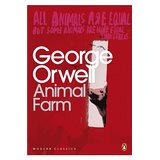‘Plague’ On sale now £9.99
Tags
Follow J.J.Anderson on Facebook
Follow J.J.Anderson on Pinterest
Archives
-
Recent Posts
Categories
http://www.thestorybazaar.com/rss.xml
Social
-
Privacy & Cookies: This site uses cookies. By continuing to use this website, you agree to their use.
To find out more, including how to control cookies, see here: Cookie Policy
A feast for the imagination


 RSS – Posts
RSS – Posts
‘Four legs good….
This short-hand phrase of binary opposites, has become what would now be called a meme† and it’s been used to illustrate a variety of ideas, all relating to the original book. The use of the media to obscure the truth ( in Animal Farm the sheep bleat the slogan to drown out any true debate at meetings ), the absolute nature of political dogma and the indoctrination and manipulation of the masses through propaganda. And its form, like that of a true meme, has been co-opted many times. So, in political debates – ‘out-sourcing good, in-house bad’ or ‘private good, public bad’.
to obscure the truth ( in Animal Farm the sheep bleat the slogan to drown out any true debate at meetings ), the absolute nature of political dogma and the indoctrination and manipulation of the masses through propaganda. And its form, like that of a true meme, has been co-opted many times. So, in political debates – ‘out-sourcing good, in-house bad’ or ‘private good, public bad’.
Hugh Muir, in his Guardian article on the proper respect paid to the late PC Palmer, (an article which prompted this post) is only the latest to use the ‘private good, public bad’ formulation, it has been around for years. It was first used, without irony, in the UK in 1980s governmental circles, when neo-liberal ideas began to filter into everyday life . Essential utilities, like the provision of water, power and transport were sold off, ostensibly in the pursuit of greater efficiency, a better service for the consumer or better value for money, all to be provided by private companies. Actually it was in pursuit of political ideology, just as, more recently, ‘austerity’ hid ‘shrink the state’.
. Essential utilities, like the provision of water, power and transport were sold off, ostensibly in the pursuit of greater efficiency, a better service for the consumer or better value for money, all to be provided by private companies. Actually it was in pursuit of political ideology, just as, more recently, ‘austerity’ hid ‘shrink the state’.
Thirty years later our essential services are, largely, owned abroad (something banned in the U.S. and Europe) and the Chinese are building our newest nuclear power station (at exorbitant cost to the taxpayer). The citizen receives a poor service at best and pays through the nose for what we had used to own in common. When a service provider fails, as the East Coast railway company did in 2009, the service was taken back into public ownership and run, efficiently and at a profit for the country. But, in 2015, ‘private good; public bad’ meant that it was again put out to tender, despite its users’ objections.
we had used to own in common. When a service provider fails, as the East Coast railway company did in 2009, the service was taken back into public ownership and run, efficiently and at a profit for the country. But, in 2015, ‘private good; public bad’ meant that it was again put out to tender, despite its users’ objections.
So given the popularity of sequels to ‘classic’ novels, when is an heir to Orwell going to write one? An Albion Farm where wealth is systematically siphoned away from the common weal into private, super- wealthy hands (in the manner of a Marcos or a Margaret). The good which still lies in the public realm is traduced (like the rule of law, see Enemies of the People). The idea that actions should be based upon evidence and reason is undermined, as is collective action for the good of the whole, rather than rampant individualism. It could include a TV reality competition, set in a tent with cakes, called The Great British Sell-Off. (I’m certain someone’s thought of this before, I just can’t remember who.)
wealthy hands (in the manner of a Marcos or a Margaret). The good which still lies in the public realm is traduced (like the rule of law, see Enemies of the People). The idea that actions should be based upon evidence and reason is undermined, as is collective action for the good of the whole, rather than rampant individualism. It could include a TV reality competition, set in a tent with cakes, called The Great British Sell-Off. (I’m certain someone’s thought of this before, I just can’t remember who.)
It is possible to see how we have arrived at the point where we now stand. It is even possible to see the opportunities to alter this course missed or ignored. It is very easy to become enraged (can’t you just tell).
The question is, what to do about it? Political activism? I’m not sure the party I’ve always voted for is capable of doing anything any more. In the meanwhile I’ve discovered We Own It (see web-site), as well as the Public Services International Research Unit at Greenwich University (which also has a web-site) take a look.
†From the Greek mimeme, (noun) meaning ‘imitated thing’, first used by Richard Dawkins in The Selfish Gene when discussing how evolutionary principles may also explain the transmission of ideas and cultural phenomena. He defined a meme as a unit of cultural transmission or imitation. I would have liked to hear Orwell’s take on mimetics.
If you enjoyed reading this article you might also enjoy Britain is Free! The Demagogue’s Handbook The Demagogue’s Dictionary
Share this:
Posted on 19th April 2017 by juliej Leave a comment
This entry was posted in Political comment and tagged Political comment. Bookmark the permalink.